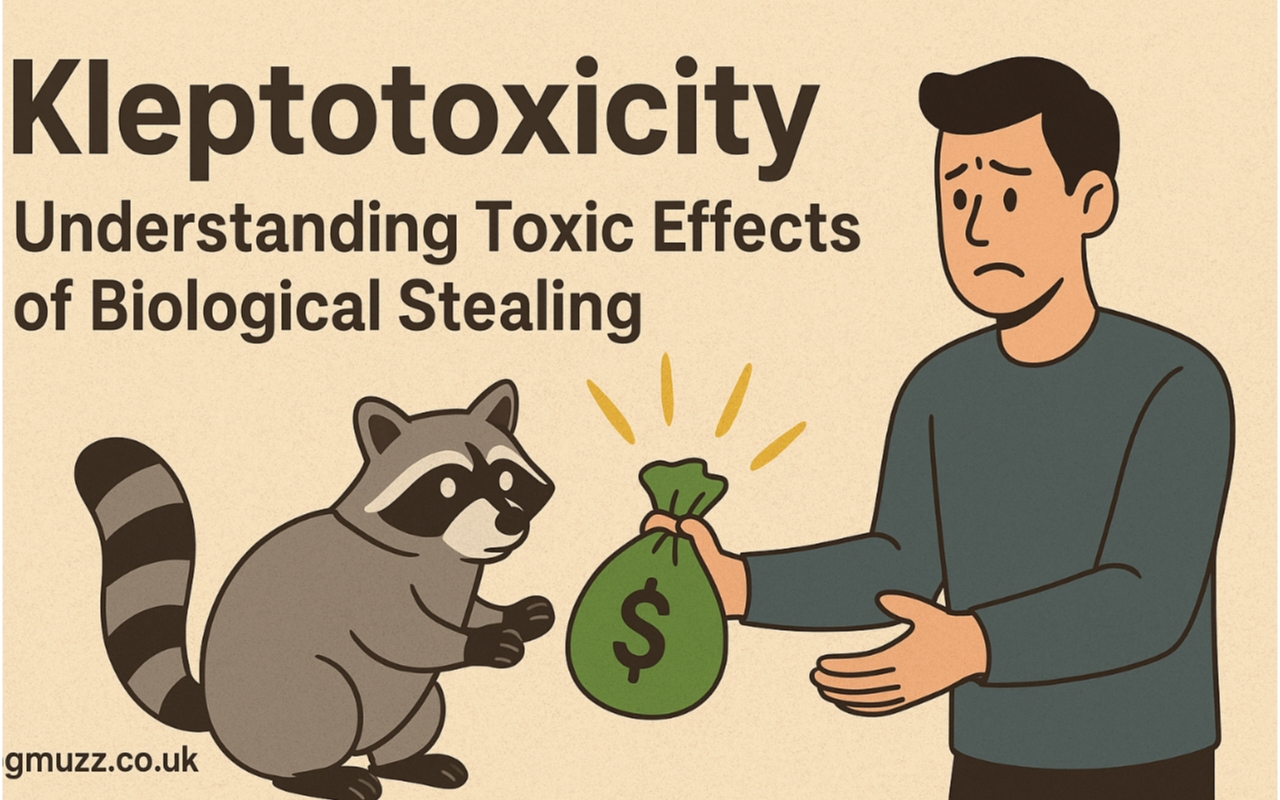What Is Kleptotoxicity?
Kleptotoxicity is a fascinating yet relatively new concept in biology that describes a paradoxical effect: when one organism steals biological material, energy, or resources from another, the act of “stealing” becomes toxic to the thief itself. The term comes from the Greek klepto (to steal) and toxicity (poisonous or harmful).
Unlike ordinary parasitism—where one organism benefits at the expense of another—kleptotoxicity implies that the benefit quickly turns detrimental. The thief takes too much, or takes the wrong thing, and the stolen resource becomes poisonous or harmful. In this way, kleptotoxicity highlights nature’s balancing act: every gain has a potential cost, especially when that gain involves exploitation.
Scientists have begun using the term to explain certain patterns in microbiology, ecology, and even cellular biology where resource theft backfires. Yet the concept also resonates far beyond biology, serving as a metaphor for systems—whether ecological, corporate, or social—that collapse under the weight of their own greed.
Origins and Scientific Background of Kleptotoxicity
The idea of kleptotoxicity has roots in several existing biological concepts, particularly kleptoplasty and kleptoparasitism.
- Kleptoplasty occurs when one organism “steals” chloroplasts from another and keeps them for its own photosynthesis. Some sea slugs, for example, consume algae and store their chloroplasts to gain solar energy.
- Kleptoparasitism refers to animals that steal food or prey from others—such as seagulls taking fish from other birds, or hyenas stealing kills from lions.
Kleptotoxicity extends these ideas by focusing on the negative effects of such theft. In kleptoplasty, for instance, some stolen chloroplasts can generate toxic by-products if not properly maintained. In kleptoparasitism, excessive theft can destabilize populations, leading to scarcity that harms both thief and victim.
Early theoretical models suggested that there is an optimal level of resource theft that maintains ecological balance. When theft exceeds this threshold, the system becomes “kleptotoxic”: the environment, population, or host deteriorates so rapidly that even the thief loses its advantage.
This concept mirrors the principles of homeostasis and feedback loops found in ecological and cellular systems—nature’s built-in resistance to unsustainable exploitation.
Kleptotoxicity at the Cellular Level
At the microscopic level, kleptotoxicity offers a powerful explanation for how cells and microbes interact. Consider certain bacteria or protozoa that invade other cells to capture nutrients or genetic material. When these invaders absorb too much or the wrong type of molecule, they trigger internal imbalances, producing oxidative stress or metabolic poisoning.
For example, when a parasite absorbs host lipids or proteins it cannot properly metabolize, toxic intermediates build up. The very molecules that were supposed to enhance survival become harmful. Scientists have documented similar patterns in amoebas and intracellular bacteria, where over-exploitation leads to self-destruction.
Even in multicellular organisms, kleptotoxicity can manifest during immune responses. Some cancer cells “steal” metabolic pathways from normal cells—such as glucose uptake mechanisms—to fuel their rapid growth. Yet this theft eventually creates metabolic chaos, contributing to the tumor’s own instability and potential collapse.
Kleptotoxicity thus illustrates an elegant paradox: evolution rewards resource acquisition only up to the point where balance is maintained. Beyond that point, the taker’s gain turns into poison.
Ecological Examples of Kleptotoxicity
In ecosystems, kleptotoxicity emerges whenever resource theft undermines long-term stability. A few illustrative cases help clarify this dynamic:
- Marine Food Webs: Certain fish and seabirds practice kleptoparasitism, stealing prey from others rather than hunting themselves. When this behavior becomes dominant, prey populations can plummet, leading to starvation for both the thieves and their victims—a clear kleptotoxic feedback loop.
- Insect Behavior: Some wasps and ants steal larvae or food from other colonies. If this becomes excessive, it triggers aggressive countermeasures, escalating into mutual destruction.
- Plant–Fungal Relationships: Parasitic plants such as Cuscuta (dodder) tap into host plants’ vascular systems to draw nutrients. When the parasite extracts too much, it can kill the host prematurely, losing its own source of sustenance—a botanical case of kleptotoxicity.
In each of these examples, the same law applies: unbalanced exploitation transforms advantage into vulnerability. Over-stealing destabilizes systems until even the winner suffers loss.
Evolutionary Implications of Kleptotoxicity
From an evolutionary standpoint, kleptotoxicity may act as a self-regulating mechanism that discourages unsustainable behavior. In nature, traits that lead to self-harm are usually selected against. Thus, kleptotoxicity can prevent organisms from evolving into hyper-exploiters that destroy their own niches.
For instance, parasites that overexploit their hosts tend to die out alongside them, while those that moderate their consumption persist. The same principle can apply to social animals that share resources—too much theft within a group weakens social cohesion, reducing the group’s overall fitness.
Evolutionary ecologists describe this as an example of negative feedback in adaptive systems: when exploitation crosses a threshold, the resulting toxicity enforces balance. Kleptotoxicity, therefore, may not just be an accident—it could be an essential part of evolutionary resilience.
Kleptotoxicity Beyond Biology: Parallels in Human Society
While the term originated in biology, kleptotoxicity resonates deeply in human contexts. Our social, economic, and political systems often mirror ecological dynamics. When individuals or institutions extract more than their fair share—whether it’s wealth, natural resources, or labor—the consequences can be toxic to the system as a whole.
1. Economic Kleptotoxicity
Consider corporate greed or corruption. When companies exploit workers, environments, or markets to maximize profit, they often trigger crises—financial collapses, public backlash, or environmental degradation—that undermine their own stability. The 2008 financial crisis, for example, illustrated how unrestrained extraction of value can poison the very economy that sustains it.
2. Environmental Kleptotoxicity
Human exploitation of natural ecosystems follows a similar pattern. Overfishing, deforestation, and pollution are acts of planetary kleptoparasitism. When we steal too many resources from nature, the resulting climate and ecological breakdowns become toxic to human civilization itself.
3. Psychological Kleptotoxicity
On an individual level, excessive taking—whether emotional, social, or material—can lead to emptiness, guilt, or social isolation. The compulsive need to acquire more than one needs creates psychological toxicity, eroding empathy and balance.
In each of these realms, kleptotoxicity serves as a powerful metaphor for unsustainable taking. It suggests that exploitation, when unchecked, inevitably turns inward, harming the exploiter as much as the exploited.
The Mechanisms of Toxic Feedback
To understand why kleptotoxicity occurs, it helps to look at the feedback mechanisms involved. Biological and social systems alike maintain balance through feedback loops—processes that respond to excess or deficiency by adjusting behavior.
In kleptotoxic systems, feedback often arises from three primary mechanisms:
- Resource Depletion: Over-exploitation reduces available resources, creating scarcity that harms all participants.
- Accumulated Waste or By-Products: Theft or overconsumption produces harmful by-products—metabolic toxins in cells, pollutants in ecosystems, or economic bubbles in markets.
- Systemic Instability: As exploitation increases, systems lose their ability to regulate themselves. In biology, this might mean oxidative stress; in economics, it could mean market collapse; in society, social unrest.
These feedbacks reveal why kleptotoxicity is not an anomaly but a natural consequence of imbalance. Systems evolve to maintain equilibrium; when one part takes too much, the system retaliates with toxicity.
Kleptotoxicity and the Philosophy of Balance
Philosophically, kleptotoxicity underscores an ancient truth found across cultures: balance sustains life. The Taoist principle of yin and yang, the Buddhist concept of middle way, and even Aristotle’s golden mean all emphasize moderation as the key to harmony.
Kleptotoxicity provides a modern, scientific framework for the same insight. It shows that imbalance—especially one rooted in greed or over-acquisition—produces its own poison. Whether in ecosystems, economies, or human hearts, stealing beyond one’s needs leads to decline.
By studying kleptotoxicity, scientists and thinkers alike gain not only a biological principle but a moral one: the cost of theft is ultimately borne by the thief.
Future Research and Applications
The study of kleptotoxicity is still in its infancy, but it opens exciting new frontiers. Potential research directions include:
- Microbial Ecology: Understanding how kleptotoxicity shapes microbial competition could improve antibiotic design or pathogen control.
- Cancer Research: Investigating metabolic kleptotoxicity in tumors might reveal vulnerabilities in cancer metabolism.
- Environmental Management: Modeling kleptotoxic feedback in resource systems could guide sustainable policy and conservation strategies.
- Artificial Intelligence and Economics: The principle of kleptotoxicity could inform algorithms that discourage over-extraction of data or capital, promoting long-term system health.
Each of these avenues reflects the universal logic of kleptotoxicity: the health of any system depends on reciprocity and restraint.
Conclusion: Lessons from Kleptotoxicity
Kleptotoxicity teaches us that taking without balance carries a built-in cost. In nature, this cost appears as metabolic poisoning or ecological collapse. In human systems, it manifests as corruption, inequality, and psychological decay.
By understanding kleptotoxicity, we recognize that sustainability is not merely an ethical choice—it is a biological necessity. Systems that consume without replenishment, exploit without empathy, or steal without foresight inevitably destroy the very foundation of their survival.
In a world facing unprecedented environmental and social crises, kleptotoxicity serves as both a warning and a guide. It reminds us that the line between benefit and poison lies not in what we take, but in how much we take and how wisely we give back.



